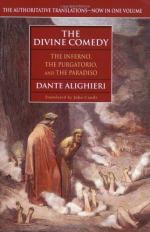And o’er my Spirit, that in former days
Within her presence had abode so long,
No shudd’ring terror crept. Mine eyes
no more
Had knowledge of her; yet there mov’d from her
A hidden virtue, at whose touch awak’d,
The power of ancient love was strong within me.
No sooner on my vision streaming, smote
The heav’nly influence, which years past, and
e’en
In childhood, thrill’d me, than towards Virgil
I
Turn’d me to leftward, panting, like a babe,
That flees for refuge to his mother’s breast,
If aught have terrified or work’d him woe:
And would have cried: “There is no dram
of blood,
That doth not quiver in me. The old flame
Throws out clear tokens of reviving fire:”
But Virgil had bereav’d us of himself,
Virgil, my best-lov’d father; Virgil, he
To whom I gave me up for safety: nor,
All, our prime mother lost, avail’d to save
My undew’d cheeks from blur of soiling tears.
“Dante, weep not, that Virgil leaves thee:
nay,
Weep thou not yet: behooves thee feel the edge
Of other sword, and thou shalt weep for that.”
As to the prow or stern, some admiral
Paces the deck, inspiriting his crew,
When ’mid the sail-yards all hands ply aloof;
Thus on the left side of the car I saw,
(Turning me at the sound of mine own name,
Which here I am compell’d to register)
The virgin station’d, who before appeared
Veil’d in that festive shower angelical.
Towards me, across the stream, she bent her eyes;
Though from her brow the veil descending, bound
With foliage of Minerva, suffer’d not
That I beheld her clearly; then with act
Full royal, still insulting o’er her thrall,
Added, as one, who speaking keepeth back
The bitterest saying, to conclude the speech:
“Observe me well. I am, in sooth, I am
Beatrice. What! and hast thou deign’d
at last
Approach the mountainnewest not, O man!
Thy happiness is whole?” Down fell mine eyes
On the clear fount, but there, myself espying,
Recoil’d, and sought the greensward: such
a weight
Of shame was on my forehead. With a mien
Of that stern majesty, which doth surround
mother’s presence to her awe-struck child,
She look’d; a flavour of such bitterness
Was mingled in her pity. There her words
Brake off, and suddenly the angels sang:
“In thee, O gracious Lord, my hope hath been:”
But went no farther than, “Thou Lord, hast set
My feet in ample room.” As snow, that
lies
Amidst the living rafters on the back
Of Italy congeal’d when drifted high
And closely pil’d by rough Sclavonian blasts,
Breathe but the land whereon no shadow falls,
And straightway melting it distils away,
Like a fire-wasted taper: thus was I,
Without a sigh or tear, or ever these
Did sing, that with the chiming of heav’n’s
sphere,
Still in their warbling chime: but when the strain
Of dulcet symphony, express’d for me
Their soft compassion, more than could the words
“Virgin, why so consum’st him?”
then the ice,
Congeal’d about my bosom, turn’d itself
To spirit and water, and with anguish forth
Gush’d through the lips and eyelids from the
heart.




